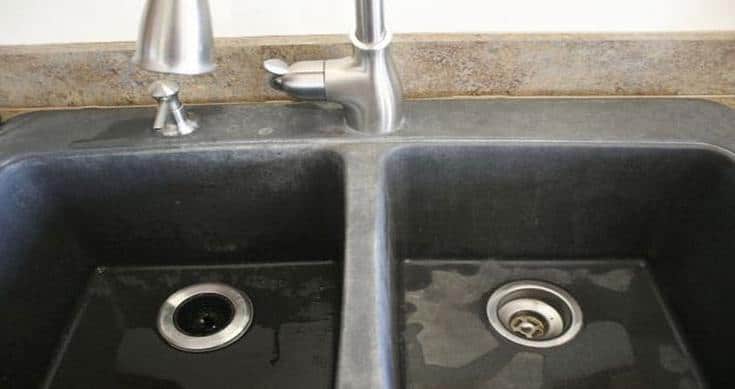Do Granite Composite Sinks Crack & Scratch Easily?

Granite composite sinks are a popular choice for kitchens and bathrooms because of their beautiful appearance and durability.
The days of needing a separate sink for dishes and another sink for hand-washing are gone. Granite composite sinks come in a variety of colors and styles to match any kitchen. But with the popularity of these sinks comes a question: do granite composite sinks crack & scratch easily?
Although these sinks are more expensive compared to other materials, they are extremely hard and not easy to crack and scratch. Because of the extraordinarily high density of rock particles on the sink’s surface, these sinks provide the maximum level of durability.
Granite Composite Basics: How It is Made
As the name suggests, a granite composite sink is made up of a variety of materials. In general, the phrase refers to materials made up of acrylic resins and pulverized mineral content, which is commonly quartz, granite, or both.
Granite composite sinks are sometimes just called “granite sinks”. This naming is a misunderstanding because they are not honed as a complete piece from solid quarried granite.
Many so-called granite sinks, on the other hand, are actually a combination of granite and quartz powder, as well as acrylic resins, molded into a sink form and occasionally incorporated with the countertop.
Depending on the manufacturer and the nature of the composite material, this sort of composite sink may be labeled “granite,” “composite granite”, or “composite quartz.”
A composite sink has a homogeneous appearance and does not resemble actual stone. When you are looking to buy a sink, ask the salesperson if the sinks are carved from stone or if they’re truly a combination of materials incorporating real stone.
The cost of the sink is also a factor to consider. Solid granite sinks are more expensive than composite sinks because massive chunks of granite are more difficult to source, carve, and polish into a sink form.
Granite Composite Sinks Crack & Scratch Causes
Granite composite is constructed of sand/stone, so the cracks & scratches are to be expected. A granite composite sink can crack and scratch for a variety of reasons.
If we explore further, there are both natural and man-made causes to these cracks and scratches.
Cracks & scratches can appear for a variety of reasons. We will take a closer look at some possible causes below.
Contraction & Expansion During Usage
As you may know, a composite sink is a composite material, so they are not one solid piece in nature. They are made up of 80 percent natural quartz sand.
Because it is made of natural materials, it may expand and contract in response to temperature changes. The sand expands when it is hot and contracts when it is cold.
However, because the sink is such an important part of the kitchen, it is usually topped with a hot or cold pan. Where the sink is installed, it is precisely fitted to the kitchen area, with no room for expansion. So the sinks are prone to cracks.
Piling Many Things on the Sink
A kitchen sink is normally a place for just any normal sink does clean dishes, spoons, and any other kitchen tools.
It is not intended as a place to put other items in the kitchen. But sometimes, people pile a lot of stuff on a sink for an extended period of time. This is not a good idea.
As a result of the unequal pressure distribution, the sink’s strength declines, eventually leading to cracks and possible breaks.
During Transportation
When you buy granite composite sinks, they are delivered to you either from the store or from the factory. The products may be strained throughout the transportation process. The truck’s rough movement might put extra strain on the composite. And this pressure may lead them to cracks.
During Installation
After you’ve purchased the granite sink, it is time to put and install it in your kitchen. Probably you would hire a professional to do it for you because installing sinks is no easy task for average people. The installation process is not simple. Furthermore, the sinks are large and would need additional installation help.
The granite sinks may experience excessive pressure during installation. It may also slip and collide with a wall, creating the possibility of a future crack. As a result, I recommend that you only hire an experienced professional to do the installation.
How to Remove Scratches From a Granite Composite Sink
It can look bad if these granite composite sinks are scratched. If they aren’t fixed right away, they could get worse and cause more damage.
To remove scratches from it, simply apply some common household products to the surface of the sink. You won’t need any special equipment to get your composite sink looking like new again.
- Using a water-moistened soft cloth, apply a drop of home dishwashing liquid.
- With the soft towel, wipe gently the scratches and the surrounding area.
- Using a dry cloth, dry the scratches and overall sink surface.
- Pour white vinegar into a glass basin.
- In the bowl, moisten a paper towel.
- Place the wet paper towel on top of the scratches.
- Wait for 20 minutes, then remove the paper towel.
- Using a soft, dry cloth, carefully dry the scrape and the surrounding area.
- Using a low-abrasive cleanser, run a line down the length of the scrape.
- On one side, start with a clean edge of a soft cloth at the beginning of the scratch. As you slide the cloth across the scrape, press down on it.
- Once you’ve reached the end of the scrape, remove the cloth. Rep this process four more times.
- Wipe the scratched area with a gentle cloth dampened with water. Dry the area thoroughly with a gentle, dry towel.
Are Granite Sinks Better Than Stainless Sinks?
Each type of sink has its own advantages and disadvantages. Some people may prefer granite sinks because they are durable and can resist scratches, while others may prefer stainless steel sinks because they are easier to clean.
In the end, the decision about which type of sink is best for you will depend on your individual needs and preferences.
Granite sinks have some benefits compared to stainless sinks. Granite is less prone to damage and produces less noise than stainless steel.
Stainless steel is easier to maintain and less expensive than granite. But the drawback is it lacks the color possibilities and durability of the stone. Stainless steel is also quite difficult to keep shiny and clean.
If you prefer a glossy look for your sinks to match your kitchen, then stainless steel is your better choice. Granite composite sinks are only available in matte finishes.
How to Clean a Granite Composite Sink?
Granite composite sink is a durable, high-quality material that is easy to clean and maintain. Cleaning a granite composite sink is not as difficult as it may seem. In fact, with just a few simple steps, your sink will be looking and smelling fresh in no time.
However, there are a few things you should know in order to keep your sink looking its best. Below, we will discuss how to clean a granite composite sink.
1. Use a soft cloth or sponge to clean the sink. If possible, use soft or microfiber cloths (eg. E-cloth). Apply gently to the surface while cleaning it. A nylon scratchpad or toothbrush can be used only in difficult areas.
2. Use warm water and a mild detergent. A mixture of 50% water and 50% white vinegar can be used to remove limescale deposits. Please make sure to rinse thoroughly after use.
3. Be sure to rinse the sink thoroughly after cleaning them. This is needed to remove all the soap residue. If you use a mixture of vinegar and water, do not leave the vinegar in contact with the surface.
4. To remove stubborn stains, you can use white vinegar, hydrogen peroxide, or liquid dishwashing detergent. If needed, you may use a baking soda paste to scrub it clean.
5. Apply a thin coat of car wax to the sink every few months to help protect it from scratches and other damage.
6. If the sink gets too hot, it can crack or bubble. To prevent this from happening, use aluminum foil on the bottom of the sink to insulate it and keep it cooler.
Can You Use Bleach on Granite Composite Sinks?
It depends on the brand of granite composite sink that you have. Some brands are made with materials that can withstand bleach, while others are not. If you’re not sure whether your sink can handle bleach, it’s best to check with the manufacturer before using it.
Even if your sink can handle bleach, it’s always best to use it sparingly. Bleach can damage the surface of your sink over time, so it’s best to use it only when necessary.
If you’re not comfortable using bleach, there are other ways to clean your granite composite sink. You can use dish soap and water, or a vinegar and water solution.
Final Thought
Granite composite sinks are a popular choice for many homeowners. While they may initially be more expensive than traditional stainless steel sinks, they can last for many years with proper care. So, if you are looking for a long-lasting sink that will add some character to your kitchen, a granite composite sink may be the perfect choice for you.
Granite is a durable material that can last for years without any maintenance. While the surface of it may be scratched, this will not affect its longevity or durability. The scratches would not so obvious, but the cracks can be visible. It is important to clean the surface regularly to keep the stone looking new and vibrant.





